Past Events
Our regular events include:
- The Annual Women's Dinner
- The Women's Leadership Programme
- The Not the Milk Round Career Event
- Informal Drinks and Networking in London
You can find reports and details about past events, including some recordings, by clicking on the event titles below:
The St John’s College Women’s Network (SJCWN) organised an online talk by Dr Louise Ashley about the Diversity in the City!
Dr Ashley, an Associate Professor at Queen Mary University in London, specialises in researching diversity and inclusion in large multinational organisations and 'elite' occupations with a particular focus on social mobility and class. Her recently published book, Highly Discriminating: Why the City isn't Fair and Diversity Doesn't Work, explores why City firms generate classed inequalities, how they benefit, and why diversity programmes often have a limited effect. She sits on several advisory committees in social mobility and in 2022 was a working group member for the City of London Corporation's Taskforce on Socioeconomic Diversity.
Dr Ashley was in conversation with SJCWN Steering Group member, Alex Bollen (1991, Modern History), for a wide-ranging discussion which will consider what is going wrong with diversity efforts and what individuals, organisations and government can do about this.
The Women’s Network is pleased to present the recording of a conversation between JCR member Issy Stephens and Helene Guillaume.
Helene is the founder and CEO of WILD.AI, an app that optimises your training schedule based on your menstrual cycle. Helene studied Mathematics and has a Master’s in Financial Risk. She has had a varied career, ranging from quantitative analysis to management consultancy to Fortune500 companies, and this is reflected in the conversation that took place. She makes the case that women are not men, but products, services, and devices are designed with men in mind.
We are grateful to Helene Guillaume and Issy Stephens for participating in this discussion and for permitting us to share their discussion online. Please note: the following recording contains a small amount of strong language which may be offensive to some viewers and/or inappropriate for children.
Whatever stage of life or career we are at, taking time to extend personal and professional networks is important! It might not always feel like it, but we all have something to give as well as to gain from broadening our connections with others.
On the 5th August 2020, members of the St John’s Women’s Network circumnavigated Covid-related restrictions and joined together (virtually, of course) with 32 St John’s women, past and present, to unpack and demystify ideas and practices around Networking.
It was great to bring together such a diverse group of women, all tuning in to the Zoom call from various parts of the world. The evening began with three short personal reflections on the topic by members of the Women’s Network: Emeritus Chair, Robin Gorna (1984, Theology), Izzy Fewster Jones (2015, Archaeology and Anthropology) and Jessica Kindler (2001, English), with the session then opening up to wider discussion.
The key messages that emerged were that networking isn’t the preserve of the sassy and the outgoing amongst us – everyone can find a way of connecting to others while remaining authentically themselves. Networking can be for the purposes of professional advancement, but it can equally be about building relationships that focus on personal development. Networking was talked about as a two-way street, with both parties benefitting from the exchange. It requires a combination of attitude and action; taking the initiative, being prepared to step out of one’s comfort zone and being interested in others were cited among the first important steps.
The invaluable mentoring and peer support relationships that can grow out of our networks also surfaced as we spoke and the panel pointed to the opportunities for mentoring that are available through the St John’s Online Community.
It was clear from the diverse needs in the group that more targeted sessions would be useful. With this in mind, the Women’s Network is planning to offer similar events around a number of different themes, and this time with a mentoring and peer support element built in.
The first in the series is currently under development: a workshop aimed at those who are planning to return to work having been away rearing children or engaged in other caring responsibilities or indeed for any other reason. If this is you, or if you have been through this transition and would like to share your experiences with others, please contact women@sjc.ox.ac.uk, putting the word ‘Mentoring’ as the subject header, to express your interest in taking part. We also invite you to get in touch if you have participated in a formal returner programme or if you work in a firm who are recruiting women returners. Likewise, if you would like to propose themes or be involved in any way in this series of events, we would love to hear from you.
We are grateful to Jessica Kindler (2001, English) for submitting this piece.
Salisbury and the Unexpected: Building Careers with Radical Uncertainty
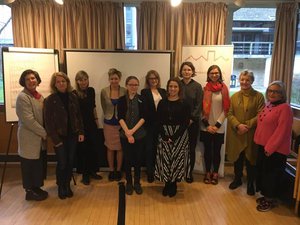
On 7 March 2020, almost exactly two years after a Russian nerve agent attack hit Salisbury, Jane Morgan described what it was like to be Communications and Development Director at the Cathedral as events unfolded. Jane is an alumna of the College, having matriculated in 1986 to read English.
We also heard from Emily Troscianko, who completed her DPhil on the "Kafkaesque" at Brasenose in 2010 and was a Junior Research Fellow in Modern Languages at St John's from 2010 to 2014, investigating "cognitive realism" in French and German literature. She now has a portfolio career that includes running a writing programme in the Humanities at Oxford, doing research on whether literary reading can have therapeutic or anti-therapeutic effects, offering recovery coaching for people with eating disorders, and writing a blog for Psychology Today.
Both Emily and Jane opened the event with presentations on their views on building careers and dealing with uncertain and surprising events. Their talks were a starting point for a conversation about where factors like linearity, predictability, conventionality, adaptability, and conceivability, and all their opposites, fit into our conceptions of the careers we have and/or want. Here are three lists, capturing a little of what we shared.
Insights
- Getting things back in your comfort zone can be creative rather than fearful.
- Dramatic anomalies tend to have long tails.
- Sources of effective authority needn’t be the obvious ones.
- Linearity appears in hindsight.
- Bad stuff happening can be fun and enriching (especially if no one dies).
- Reinvention may be a requirement, an opportunity, or both.
- We all want to be able to say what we do—but the answer needn’t be static, singular, or even true.
- We all want different stuff from our careers—stability, money, excitement, variety, etc.—and no one wants the same amounts of any of these their whole life.
- Know yourself, but leave room for growth: you don’t have to stay bad at whatever it is—and we all change radically according to context.
- We can brag about “unconventional” or “nonlinear”, or be ashamed of it—or just ask, what do these terms actually mean, and do they make sense for me, now?
- Perceived agency matters: helplessness is key in determining whether we respond constructively to change or not.
- Taking risks is a privilege—if you have it, don’t waste it.
- Mentoring and networking reduce risk.
- Nonlinear ≠ not earning.
- Jobs don’t necessarily get more rewarding as you get promoted, but it’s hard to move “down”.
- We all know we’re smart—or do we?
- We all know we’re smart—but can “clever” be a trap?
- Do/should we give praise for success or for effort?
- You live life forward, but it’s nice to take time to notice how the story you tell yourself could be told otherwise
Practical Suggestions
- Take the first step: allow yourself to ask “what do I want to do?” and “what is important to me?”
- Keep an eye out for things to try on the side. Then try them.
- You have more transferable skills than you think. Take a bit of time to work out what they are.
- Not doing simultaneous/parallel skills development is the norm, but it’s more likely to happen if you ask of yourself just one step, not the next 15 all at once.
- Find out what the day-to-day of lots of jobs is like—ask people whether you can shadow them.
- Invite people you admire and want to learn more about for tea and cake and conversation. People like talking about themselves, and feeling useful.
- Work out what networks you already have. Use them, and expand them, as diversely as you can.
- Try describing your life (to yourself and/or other people) in terms of things not done as well as things done; not “x and y and z” but “x and y but z”. What changes?
- Ask what scares you, and act accordingly (either seek that stuff out because the fear not the reality is the problem, or accept that it’s better off not in your life for now).
Resources
- How to Fail
- Real Talk Radio
- How To Own the Room
- Women with Balls
- Brené Brown
- Ramit Sethi (especially his mailing list content)
- And what do you do? 10 steps to creating a portfolio career and a workbook inspired partly by this book (both offer guidance in working out what you actually want to do, whether in a “portfolio” format or not)
- Resilience
- Overcoming a sense of academic failure
We are grateful to Emily Troscianko for submitting this piece.
Members of the SJC Women's Network came together to meet and listen to Dr Kate Doornik and Cressida Hogg CBE
St John’s College Women’s Network Annual Dinner took place in the College SCR in September. This annual fixture attracted a mix of regular attendees and new, who it is hoped will in turn spread the word of the network within their networks to broaden the SJCWN’s real and virtual reach. Amidst the opportunity to catch up with familiar faces, associations from across the decades were rekindled. It is certainly the intention for future events to facilitate more mingling during the evening, and opportunities to continue conversations afterwards.
Ann Hyams (2008, Geography), as MC, introduced two similarly august speakers with refreshingly distinct perspectives to share their reflections on their careers to date.
Dr Kate Doornik, Fellow and Tutor in Economics, St John’s College shared a series of disarmingly humorous anecdotes of her from tine at McKinsey, Harvard and St John’s. Dr Doornik’s consciously selected as her first byline “being in the right place at the right time”, serendipitous happenstance propelling her career forward. Until, as she reflected, research around gender bias as part of her time as the College Fellow for Equality prompted new scrutiny of the narrative. A revisionist approach recognised gender traits in attribution: when women do well they often attribute it to good fortune, rather than their own talents. On reflection, it was clear, even allowing for Kate’s humility, that luck played far less of a role than her skill in effectively sensing, and seizing opportunities and skilful execution once in post! A short summary of Dr Doornik’s recent admission research followed, and some unexpected results posing questions around relative rather than absolute under-performance of under-represented segments. Dr Doornik commented on the particular challenges of tackling the intersectionality of diversity, and closed with a request that we all engage with our neighbours over the next course and are careful to tell their story as active protagonists.
From her vantage point as Board member of London Stock Exchange and LandSec, Cressida Hogg CBE (1987, PPE) offered us a different perspective of where her gender has provided a distinct edge, diversity of approach and thought in an industry, where gender representations continues to lag other sectors. Leveraging EQ, emotional intelligence, as well as traditional intellectual skills to establish trusted relationships was a recurrent theme. As was a sanguine reflection on the pace of life. Using Formula 1 as a metaphor, Cressida cautioned to us all to regularly maintain our motor car for longevity. Driving at F1 speeds is all very well for a few laps, however, to finish the race requires some careful attention, and a diverse team to keep the car running smoothly.
Dr Liz Fouksman on Reimagining the Future of Labour and Distribution
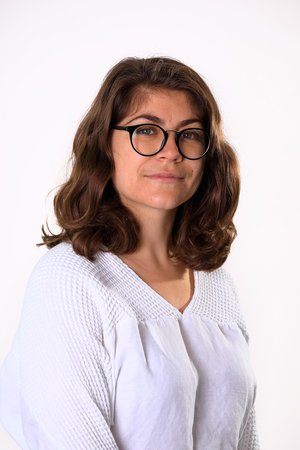
At the end of August 2019, around 30 alumni piled into a room in Vauxhall, London, to hear Dr Liz Fouksman, a Leverhulme Early Career Fellow at St John’s, present some of her ongoing research into the future of work and labour.
For the next hour, Dr Fouksman provided a compelling glance into social and cultural attitudes to work and labour. She delved into the history of labour practices, sharing insights from her own fieldwork to showcase how workers’ rights and attitudes to work have evolved since the industrial revolution, and proposed several ways they might change in response to future shifts, from the rise of AI and robots in the workplace, to changing attitudes to work and leisure.
As well as this insight into our potential futures, Dr Fouksman revealed some surprising historical trends. For instance, given how radical an idea the 4-day work-week seems now, it is astonishing that when the idea of the weekend and the 5-day work week first emerged, it was accepted and adopted much more quickly. The attitudes we have around work, dignity and livelihood have changed fundamentally in the last few decades, and it’s hard to predict how they will continue to shift. What is clear is that we need more social discourse and governmental policy to respond effectively to these shifts.
This talk was the first in a series of informal London events designed to showcase some of the postgraduates currently carrying out work at St John’s, and highlight the ambition and impact of their work. For the alumni in attendance, it was not only a chance to connect with others from St John’s and gain insight into this fascinating topic, but also an opportunity to see the impact of the research being carried out by the current generation of St John’s students and researchers.
Dr. Liz Fouksman is a Leverhulme Early Career Fellow at St John's, with a departmental home at the African Studies Centre at the Oxford School of Global and Area Studies. Previously she has held research fellowships at Harvard University and the University of the Witwatersrand. Liz holds a doctorate in International Development from the University of Oxford. Her work focuses on moral, social and cultural attachments to work and working among the long-term unemployed, as well as on the global movement around universal basic income.
On Saturday 18 May 2019 St John’s College Women’s Network was delighted to welcome alumna Professor Sarah-Jayne Blakemore back to College to discuss her work and recent award-winning book, Inventing Ourselves: The Secret Life of the Teenage Brain.
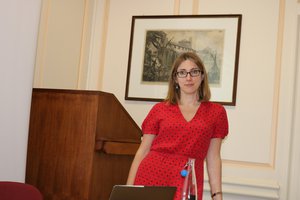
It is, strangely, acceptable to mock and demonise teenagers; the same stereotypes of lethargy, bad manners and disrespect for authority have endured through millennia and across cultures. Adolescence is a transitional period that we all experience between puberty and adult independence, so undergraduates arriving at St John’s College are, for the most part, still adolescents, and Freshers’ Week reflects these classic behaviours.
Sarah-Jayne matriculated in 1993 to read experimental psychology, then continued with post-graduate studies at UCL. During her PhD research in self-monitoring in schizophrenia, she observed how many symptoms of mental illness first manifest in adolescence, and yet we know comparatively little about the adolescent brain, its development or why it may increase vulnerability to mental health.
As Professor Blakemore notes in her book, technological advances, notably MRI scanners, meant neuroscientists could finally conduct longitudinal studies of adolescent brains, and at scale. Science textbooks had to be rewritten as researchers discovered that substantial and protracted changes occur in the brain right into adulthood.
Professor Blakemore described how particular aspects of these neurodevelopmental processes are influenced by environmental experiences, notably social environment and peer pressures. Why might teenagers sometimes take risks that seem irrational in the face of the known consequences – why might your teenage daughter smoke, for example? Because she simply perceives the social risk as higher than the health risk. Blakemore highlighted how these same peer pressures can be harnessed in positive ways to empower and engage: an anti-bullying campaign co-created by school children was more successful than other interventions imposed from above. You can read more of Professor Blakemore’s work in this article recently published in The Lancet.
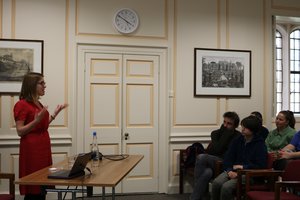
We were all teenagers once, and many of us are, or will be, parents of teenagers at some point. Sarah-Jayne’s work, her accessible writing and engaging talks mean the workings of the adolescent brain are now less mysterious. Parents, policy makers and education practitioners everywhere can pause for thought and a little more empathy before we rush to judgement.
This was the first event that the Women's Network has organised with a more academic focus, engaging an audience of alumni (not just alumnae), their families, College fellows, and faculty academics. A delicious tea followed with plenty of time to catch up or confer further: very much reflecting the aims of the St John’s College Women’s Network to inspire, celebrate and empower all women associated with the College.
St John's Women's Network provided an informal alternative to the more traditional university recruitment fair.
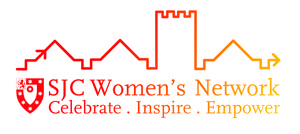
Over forty students from St John’s attended the Not the Milk Round event in College on 25th January. Supported by the Women’s Network and organised by former JCR President and undergraduate Christine Jiang, the aim of the evening was to provide a less formal alternative to the more traditional university recruitment fair, introducing students to inspiring St John’s alumnae, who returned to talk about their work experience and professional lives after graduation.
Working in areas as diverse as molecular diagnostics in cancer research, to international development, the five speakers were able to bring a very personal approach to career advice over dinner in the Garden Quad. They included Women’s Network Committee member Rosie Le Voir and Chair Robin Gorna.
You can see more photos of the event here. To find out what other events are planned, please download Women’s Network Events for 2019.
Inspiring, enabling and sustaining women's achievement
St John’s College first admitted women in 1979. In the academic year 2013-14, the 2000th woman matriculated. To mark this milestone the College hosted a series of events and initiatives during 2014 and 2015 to celebrate, inspire and sustain the achievements of St John’s women.
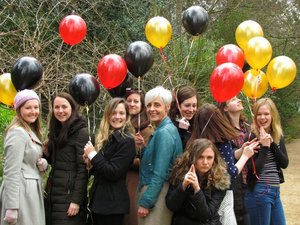
Celebrate
Why did we celebrate? Quite simply, we had a lot to celebrate. We remain a vibrant and dynamic community of scholars. We have launched the careers of many women and St John’s women contribute to the health and wellbeing of society across the world and in all kinds of ways. A big party was held on 4 July 2015 to celebrate the end of our 2000 Women year, and we were delighted to welcome many alumnae back to College for this event.
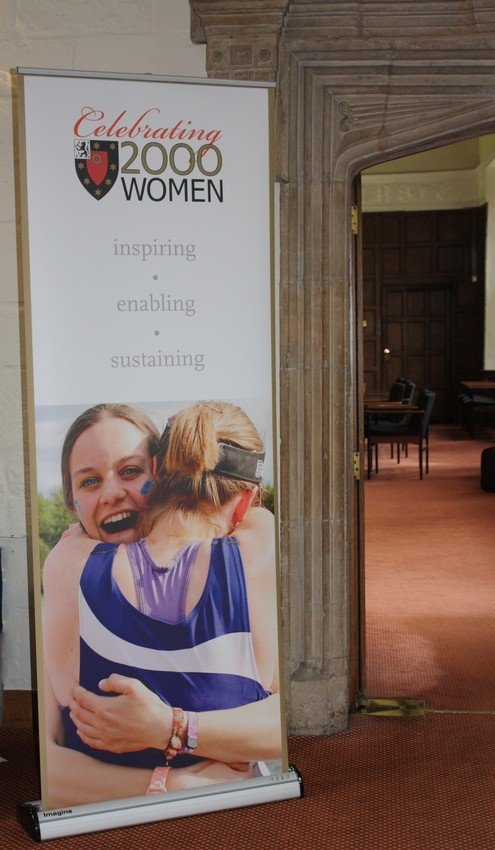
Inspire
Women are still less well represented in higher-level positions in the workplace, in public policy and in society at large. We believe we must, and we can, inspire our current and former students to be confident about the contribution they can make in their lives. The College hosted numerous Inspire events in 2014 and 2015; thank you to all those who spoke at or attended them.
Enable and sustain
We admit talented young people who during their time at St John’s show exceptional promise and achieve great things. It is our duty to help them sustain their achievements long after they have left St John’s, following in the footsteps of those women who have gone before. In 2014 we launched Springboard, a programme for our undergraduate women students to help them take more control over their lives by increasing their self-awareness, building their assertiveness skills and confidence, and helping them identify their paths to success.
Choice and balance
If you missed out on Fran Bryden's workshop 'Choice & Balance' during the Big Party weekend, Fran (1982) has kindly agreed to share her slides and some anonymous quotes from the session.
The workshop looked at how to get perspective on your life and choices by sharing with other women, evaluating solutions tried by others and deciding what issues are important.
Leadership, participation and equality
The 2000 Women Plenary and Panel discussions on Leadership, Participation and Equality are now on the St John's podcast page.
The Plenary looked at how 2000 Women and an ongoing St John's Women’s Network might best support women to ever greater success and fulfilment. The President chaired the discussion with Rowena Ironside, Chair of 'Women on Boards'; Sarah-Jane King (1997), Deputy Head of the Unit for Equality Legislation, European Commission; and Nadia Motraghi (1997), a barrister specialising in employment and discrimination law.
Check for updates on the Women's Network Facebook Page